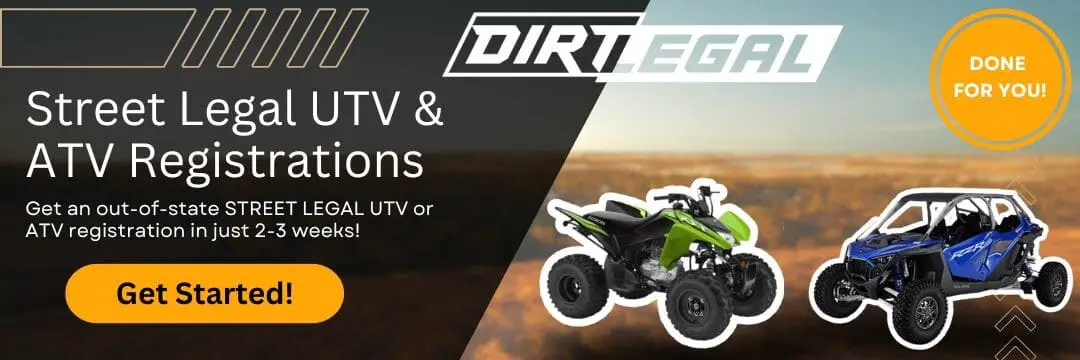Table of Contents
In this article, we will explore the street-legal laws for ATVs and UTVs in the state of Colorado. As an off-road vehicle enthusiast in Colorado, it’s crucial to understand the street-legal laws governing the use of ATVs and UTVs. Here, we will also explore the exceptions and restrictions associated with operating ATVs and UTVs on public roads.
1. Can I register my ATV or UTV as street-legal in Colorado?
No, you cannot register your ATV or UTV as street-legal in Colorado according to the statewide legal code. This means they cannot be legally operated on public roads and highways.
ATVs and UTVs are permitted for use as offroad vehicles in Colorado, and there are some exceptions to the street legal policy at the county or city level, or under special circumstances outlined below.
2. Why does Colorado not allow ATVs or UTVs to register as street-legal?
ATVs and UTVs cannot be registered as street-legal in Colorado because the operation of these vehicles in Colorado streets and highways is considered unlawful. This provision in the Colorado Code is a recent update to the Colorado Code that took effect in 2021. This said, there are a number of exceptions to this policy (see question 3, below).
3. Where can I legally ride my ATV or UTV in Colorado?
In Colorado, you may still legally ride your ATV or UTV in parks and trails. If you are a resident of Colorado, then you will need to get an OHV Registration, whereas, if you are a non-resident, you can apply for an OHV Permit.
On-road use of ATVs and UTVs in Colorado varies per jurisdiction (by county or city for example). Thus, it is advised that you contact the local motor vehicle licensing agency in the cities/counties you plan on taking your ATV or UTV to.
Albeit being restrictive in the use of ATVs and UTVs on public roads and highways in Colorado, the state’s code has provided for a few exemptions. In Colorado, an ATV or UTV may be operated when:
- streets, roads, or highways are designated “open” by the state or any agency of the state;
- crossing streets or when crossing roads, highways, or railroad tracks;
- crossing a bridge or tunnel;
- there are special off-road vehicle events;
- there is a state or local emergency that has been announced by the proper authority;
- local political subdivisions have approved off-highway vehicle routes by law or resolution so that off-highway vehicles can be driven on city streets or county roads, but no street or road that is part of the state highway system can be so named;
- used for farming
- used by utility companies
4. If I register my ATV or UTV in another state, can I drive it on Colorado roads? (Registration Reciprocity)
No. Colorado does not have a Registration Reciprocity agreement with other states for off-highway vehicles. But if you would like to operate your ATV or UTV in Colorado, you may apply for an OHV Registration (for residents) or OHV Permit (for non-residents).
Each state has its own specific laws and regulations regarding the registration and operation of ATVs and UTVs. Therefore, even if your vehicle is registered as street-legal in another state, it does not exempt you from Colorado’s laws and restrictions. Always check with your local motor vehicle licensing office for accurate information on the regulations relating to the use of ATVs and UTVS in public roads under their jurisdiction. Click here to view ATV & UTV laws in other states.
5. How can I make my ATV (or UTV) street legal in Colorado?
Generally speaking, you cannot make your ATV or UTV street legal in Colorado as the state’s legal code does not allow for this, nor does it allow for you to drive an ATV or UTV that is legally registered in another state on Colorado public roads and highways.
However, if you would like the opportunity to be able to register your ATV or UTV as street-legal and ride it on public roads and highways in states that will allow it, we have partnered with Dirtlegal.com. These guys can help get your ATV or UTV to register as street-legal in most states by registering it in another state that does allow street legal UTVs and ATVs, via “registration reciprocity” between the states.
Get STREET LEGAL with DirtLegal.com
Conclusion:
In Colorado, ATVs and UTVs are not eligible for street-legal registration and, generally, operating them on public roads is prohibited. This regulation, however, varies per city or county as these local political subdivisions are allowed to establish their own rules and regulations regarding the operation of ATVs and UTVs in public roads.
While this article has provided a comprehensive overview of the street-legal laws on ATVs and UTVs in this state, it is important that you consult your local motor vehicle licensing office for more specific and accurate information regarding ATV and UTV regulations. Because state laws can change over time and regulations differ between jurisdictions, the information presented here may not provide the most up-to-date or region-specific details.
Remember that street legality is determined by state and local laws, and it is your responsibility as an ATV or UTV owner to ensure that you are operating your vehicle within the legal boundaries while also getting the most fun out of it.
Helpful Resources:


